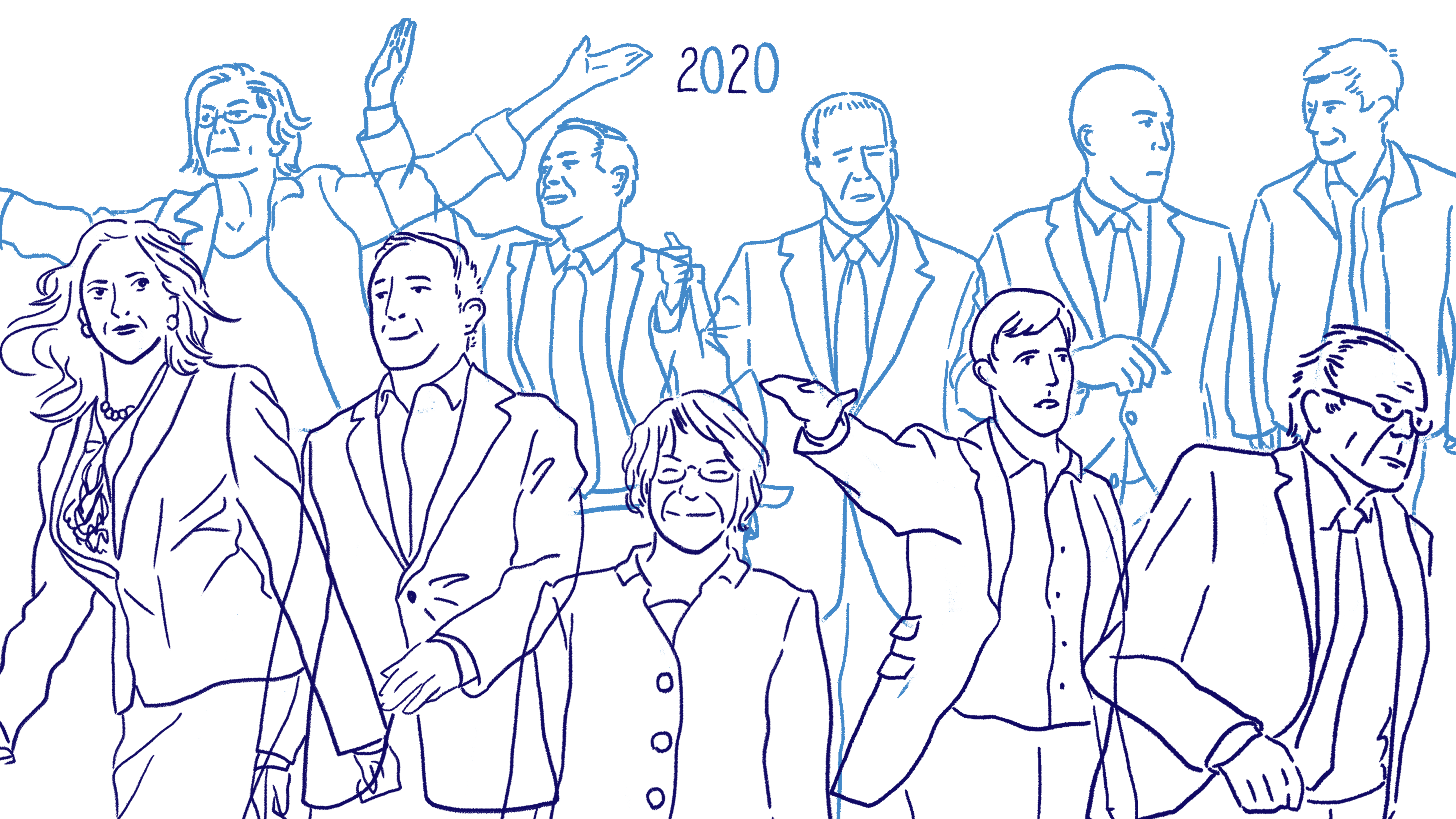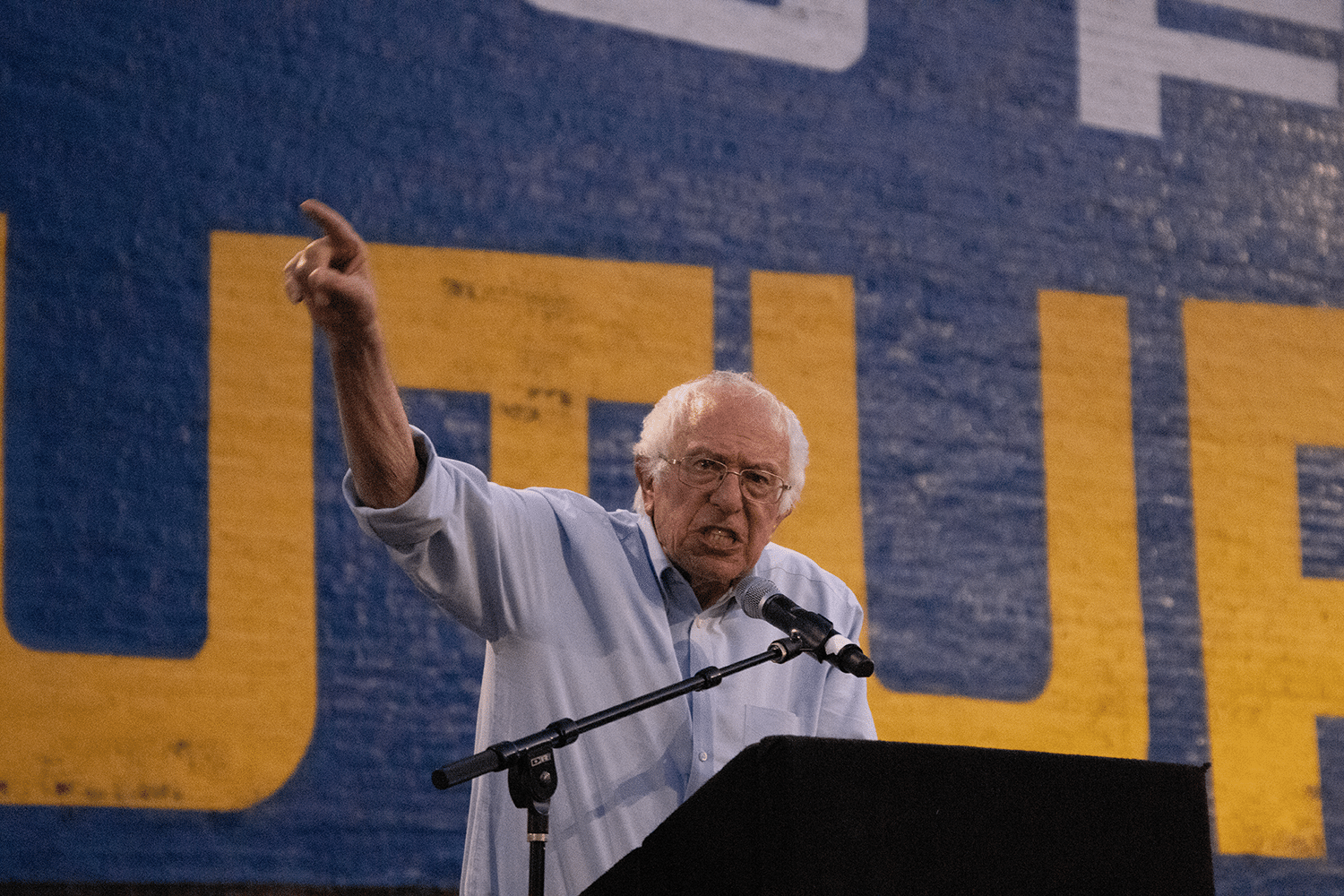During the media circus of the 2016 United States presidential campaign, the Republican and Democratic primary elections were as different as night and day. President Donald Trump emerged from a Republican Party that fielded a record-breaking 17 candidates, whereas former Secretary of State Hilary Clinton never ceded her position as the Democrat’s favorite, despite a strong run from Vermont Senator Bernie Sanders.
But in the biggest body swap since Lindsay Lohan and Jamie Lee Curtis in “Freaky Friday,” the Democratic Party has found their roles reversed. Trump is expected to be the Republican nominee, but this cycle, the Democratic Party has seen 27 candidates throw their hats into the ring. Unlike 2016, there is no favorite — according to polling data aggregator RealClearPolitics, former Vice President Joe Biden currently has the highest percentage of support in national polls at 26.8 percent. As the Democrats attempt to pave a clear political direction before the end of this year, this is basically their personal Nightmare Before Christmas.
Whether this is your first time voting in a U.S. presidential election, or you have been through this rigmarole ever since that energetic supporter yelled, “Give em’ hell, Harry!” during Truman’s 1948 campaign, it is a monumental challenge to follow the nuances of every candidate’s political platform. But that is why we have televised debates and BuzzFeed listicles on the candidates’ zodiac signs: to gauge the candidates’ personalities so we avoid electing a leader with a Twitter addiction to bigoted remarks or threats to buy other countries.
The Democratic National Convention narrowed the playing field when they chose the 10 leading candidates for the Democratic Party’s third primary debate on Sep. 12, 2019 — nine more debates are scheduled between Oct. and Apr. 2020. Here are the key takeaways about the leading candidates:
The Underdogs
Julian Castro
Qualifications:
- Secretary of Housing and Urban Development (HUD) under the Obama Administration
- Mayor of San Antonio, Texas (TX) (2009-14)
Estimated Polling Support: 1.0 percent
Key Issue: People First Immigration
- Expand avenues to citizenship for undocumented immigrants
- Reassign US Immigration and Custom Enforcement (ICE) underneath the Department of Justice
- Eliminate the backlog of 4.4 million people waiting for visas
- Reverse Trump’s Muslim and refugee bans
- Renew diplomatic relations with Central America
Castro has positioned himself as a family-first candidate, often referring to his own close relationship with his mother and grandmother. In the debates he has been the most impassioned about immigration and border issues, directly questioning O’Rourke and Biden on these issues. However, his relative youth — at 44, he’s one of the youngest candidates — and mishandling of private mortgages as the Sec. of HUD has some groups banking against Castro as a presidential nominee.
Amy Klobuchar
Qualifications:
- Minnesota (MN) Senator since 2007
- County Attorney of Hennepin County (1999-2007)
Estimated Polling Support: 1.2 percent
Key Issue: $1 trillion infrastructure program
- Replace over 50,000 structurally deficient bridges
- Provide access to clean water and Internet to every household
- Modernize all public schools
- Raise the corporate tax to 25 percent to fund initiatives
Klobuchar’s main strategy has been to bill herself as the polar opposite to Trump. For every proposal from Trump’s administration, Klobuchar has an alternate solution. The $1 trillion infrastructure program, for example, is in response to Trump’s budget calling for $200 billion for infrastructure. However, allegations concerning mistreatment of her Senate staff — leading to a 36% turnover rate, the highest of any Senator — has resurfaced during her campaign, turning away many potential donors.
Qualifications:
- New Jersey (NJ) Senator since 2013
- Mayor of Newark, NJ (2006-13)
Estimated Polling Support: 2.3 percent
Key Issue: Affordable Housing for All Americans
- Pass the Renters Credit Plan, which would subsidize anyone spending more than 30 percent of their income on rent — Booker estimates 57 million people would receive an average of $4,700.
- Pass the Equality Act to outlaw discrimination based on sexual orientation or gender identity
- Increase federal budget spending for Native American reservations and rural America
- Invest $6 billion annually towards anti-homelessness grants
Booker’s ideal is a unified nation, fighting for justice, opportunity, and American leadership. Economic disparity is at the forefront of his platform, particularly how housing and environment injustice contribute to racial segregation and discrimination. He has proposed slavery reparations for African-Americans and prison reforms that would decrease mass incarceration of non-violent criminals. However, critics have pointed at his connections on Wall Street and Super PACs — during the 2014 Senate race, no candidate received more donations from Wall Street companies than Booker — as indications that Booker has mixed allegiances.
Rolling in the Middle
Beto O’Rourke
Qualifications:
- US House of Representatives, Texas (TX) (2013-2019)
- Mayor pro tempore of El Paso, TX (2005-2006)
Estimated Polling Support: 2.8 percent
Key Issue: “Hell, yes, we’re going to take your AR-15, your AK-47.”
- End NRA influence in Congress
- Create a nationwide gun licensing registry
- Require universal background checks
- Ban assault weapons and implement an assault weapon buy-back program
- Declare gun violence a public health emergency and invest $320 million annually in the study/prevention of gun violence.
Prior to the third debate, critics were hard-pressed to identify an issue that strongly separated O’Rourke from his fellow candidates. However, in the wake of the mass shooting in his hometown of El Paso, where 22 people were murdered in Aug., O’Rourke has taken the reins on gun control. In one of the debate’s most fiery speeches, O’Rourke delivered the headliner quote, which has become the pillar of his campaign. But O’Rourke’s criminal record — in 1998 he was arrested on a DWI charge after crashing his vehicle and attempting to flee from the scene — has long been fodder for his political opponents, and this election cycle is no different. At 47, he is also relatively young and, relatively, unexperienced.
Andrew Yang
Qualifications:
- Founder of nonprofit fellowship program, Venture for America (VFA)
- Presidential Ambassador for Global Entrepreneurship under the Obama Administration
Estimated Polling Support: 3.0 percent
Key Issue: Human-Centered Capitalism
- Adjust the GDP and stock market to include measurements like mental health and social/economic mobility.
- Regulate corporations by appointing government officials that value human needs over business needs — ensured by paying them high wages and barring them from entering the private sector.
- Issue a new government currency — the Digital Social Credit — that rewards individuals and organizations that contribute to significant social advancements.
Yang proudly centers his campaign on being a champion for voters who turn to social media to digest political information. He calls his supporters the “Yang Gang” and he used the debate to promote his “Freedom Dividend” proposal, which quickly reached #2 trending on Twitter. Under the Freedom Dividend, the government would provide every American adult a monthly wage of $1,000, which would be paid for by consolidating other welfare programs like food stamps and disability — people who already collect government benefits would choose between their current benefits or the Freedom Dividend. However, as the only candidate to never hold political office, Yang’s qualifications and knowledge of key issues have been closely scrutinized.
Qualifications:
- Mayor of South Bend, Indiana (IN) since 2012
- Former U.S. Navy Reserve intelligence officer, served in Afghanistan (2014)
Estimated Polling Support: 4.8 percent
Key Issue: Reform the Executive and Judicial Branches
- Abolish the Electoral College and replace it with a National Popular Vote
- Increase the number of Supreme Court Justices to 15 judges — five Republicans, five Democrats, and five decided by the first 10 judges
- Grant full national representation rights to Washington DC and Puerto Rico
- Enact a 21st Century Voting Rights Act to end all forms of voter suppression
Buttigieg, or “Mayor Pete,” has found significant support among Midwest Christian voters, which has surprised some political analysts since he is the first openly gay presidential candidate in the Democratic Party’s history. As someone born and raised in a conservative community, he has garnered support from right-wing voters looking for an alternative candidate to Trump without bending too far to the left. “Mayor Pete”’s down-to-earth personality and surprising underdog presidential campaign landed him on the May 2, 2019 TIME magazine cover, pictured alongside his husband Chasten. However, Buttigieg’s political inexperience and 0 percent poll support among African-American voters has some Democrats distancing themselves from his campaign.
Kamala Harris
Qualifications:
- California (CA) Sen. since 2017
- 32nd Attorney General of CA (2011-2017)
- 27th District Attorney of San Francisco
Estimated Polling Support: 6.5 percent
Key Issue: Inequality Gaps
- Increase teacher salaries by at least $13,500
- End practices that see Black Americans incarcerated at 5 times the rate of White Americans
- Reduce restrictions on released criminals to improve their chances of employment and social mobility
- End the War on Drugs (which would include legalizing marijuana)
- Eliminate the gender wage gap
- Protect women’s health services
Harris placed herself into the conversation as a true contender for the Democratic ticket. She has used her law background to pose difficult questions to her fellow candidates, including her noteworthy confrontation of Biden, when she had the former Vice President scrambling for a response as to why he supported bus segregation bills in the 1970s. (Harris was part of the second class in California to integrate public schools.) However, there are enough contradictions between Harris’s career as the Attorney General of California and her progressive proposals now that have seen her take a huge slump in the polls in recent weeks.
Leading the Charge
Elizabeth Warren
Qualifications:
- Massachusetts (MA) Sen. since 2013
- Vice Chair of the Senate Democratic Caucus since 2017
- Special Advisor for the Consumer Financial Protection Bureau under the Obama Administration (2010-2011)
Estimated Polling Support: 16.8 percent
Key Issue: Tackling Washington Corruption and the Economy
- Pass the Wealth Tax: tax increases for the top 0.1 percent wealthiest households — 2 percent on net worth over $50 million, 3 percent on net worth over $1 billion.
- Pass the Real Corporate Profits tax: 7 percent on corporations that report more than $100 million in profits
- Ban senators and congressmen from trading stocks and from becoming lobbyists
- Decrease military defense spending; restrict private companies and the Pentagon from making contracts
- Place limitations on “Big Tech” to regulate tech monopolies like Amazon and Google
- Increase Social Security (SS) by $200 a month for every current/future SS beneficiary, and raise SS benefits for caregivers who leave the workforce to care for a family member.
Structured and strategic in her campaign, Warren has billed herself as a candidate for the working class and middle class — someone who will seriously contend with big business control in Congress. From her website to her debate promises to her late night show interviews, her campaign reputation has been built on being direct, sincere, and informative about her vision as president. Her biggest platform issues — financial corruption, gender and LGBT wage gaps, teacher salaries, tax reform — all speak to economic concerns that hound many voters. However, critics of Warren say that her campaign strategy can backfire, especially since a couple key divisive issues — particularly immigration and universal healthcare — have been left largely undefined by Warren’s campaign.
Bernie Sanders
Qualifications:
- Vermont (VT) Senator since 2007
- Ranking member of the Senate Budget Committee since 2015
- U.S. House of Representatives, VT (1991-2007)
Estimated Polling Support: 17.3 percent
Key Issue: 21st Century Economic Bill of Rights
- Guarantee health insurance for everyone — including 30 million people without it now — by creating a single government-run plan with no private insurance options.
- Pass the Medicare Drug Price Negotiation Act to cut prescription drug prices in half, and allow individuals or pharmacists to buy low-cost medications from Canada and other industrialized countries
- Pass the College for All Act, providing over $48 billion annually to eliminate tuition fees for four-year public colleges and trade schools
- Cancel all existing student debt — estimated at $2.2 trillion. Paid for by taxing Wall Street speculation $2.4 trillion in fees over 10 years.
- Invest $16.3 trillion toward achieving 100 percent renewable energy for electricity and transportation by 2030 and decarbonization by 2050.
Feel the Bern is picking up right where it left off in 2016. Sanders has not changed anything from his political platform from four years ago: If anything, he has grown more staunch in his beliefs. In fact, many of his policies that were deemed too radical at the time have been picked up by other Democratic candidates — like universal healthcare, or a lighter version of it in which some candidates (Castro, Klobuchar, Buttigieg, Biden) have proposed giving people the choice to keep their private insurance if they want. Ironically, the Democratic Party becoming more left-wing in their platform has actually harmed Sanders’ election hopes. That, and the fact that people like to keep reminding Sanders how old he is.
Joe Biden
Qualifications:
- 47th U.S. Vice President (2008-15)
- Delaware (DE) Sen. (1973-2009)
- Chair of the Senate Foreign Relations Committee (2007-09)
Estimated Polling Support: 26.8 percent
Key Issue: “This is Joe’s Vision for America”
. . . or is it? Basically, the former Vice President is running a campaign built on the confidence of returning to the America of Obama’s Administration. While this is very appealing to some, it has not been a favorable stance in debates. Almost all of the aforementioned candidates have taken precious time out of their speeches to directly attack conservative policies Biden supported as the DE Senator, or to demonstrate why their policy proposals are updates of what the Obama/Biden team achieved during their eight years in office. The key issues each of the aforementioned candidates emphasize are either variations or more liberal versions to what Biden’s campaign supports. But on specific issues (Booker and housing reform; Harris and criminal justice reform), other candidates have shown themselves better prepared to explain their position. During debates Biden has often stumbled over words and struggled to defend himself against accusations from his other candidates. Which is to be expected, as the competition tries to take down the presumed frontrunner for the Democratic primary. In short, Biden’s electability has started to slip, and suddenly, the Democratic Primary election appears to be wide-open.
































